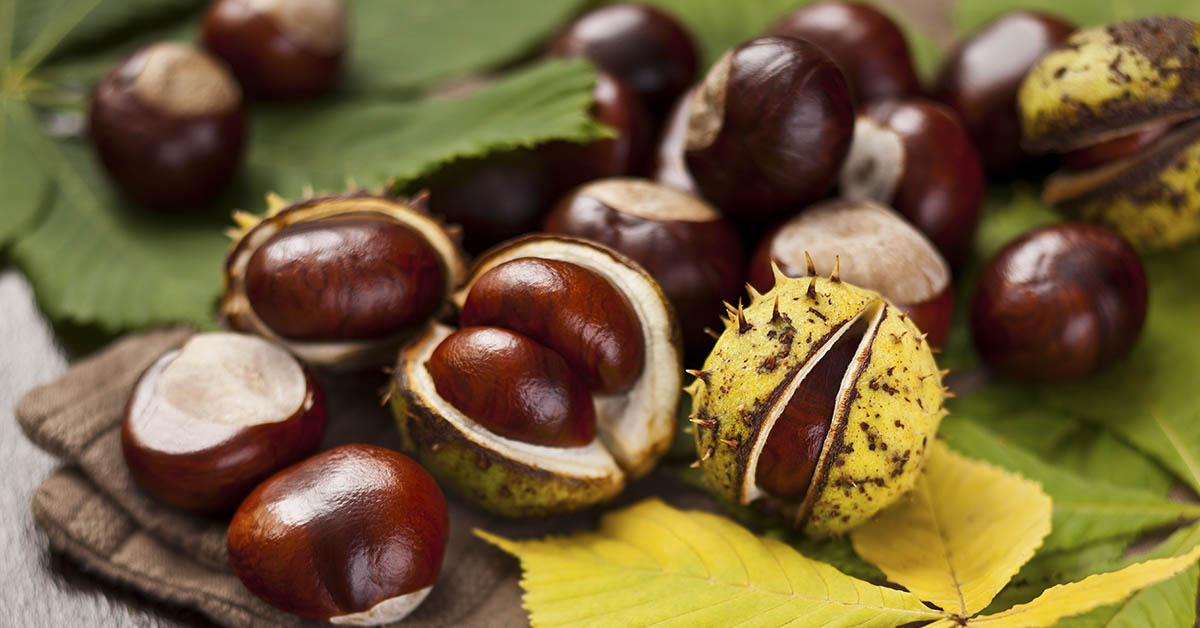This site contains product affiliate links. We may receive a commission if you make a purchase after clicking on one of these links.
Horse chestnut (Aesculus hippocastanum) is a tree native to the Balkan Peninsula but is now widely cultivated around the world. While it is commonly associated with its striking flowers and decorative appearance, extract of the chestnuts themselves also hold several potential health benefits. Horse chestnut contains a compound called aescin, which has been studied for its benefits. Let’s delve into these potential benefits and uses of horse chestnut and horse chestnut extract.
Exploring the Potential Benefits of Horse Chestnut
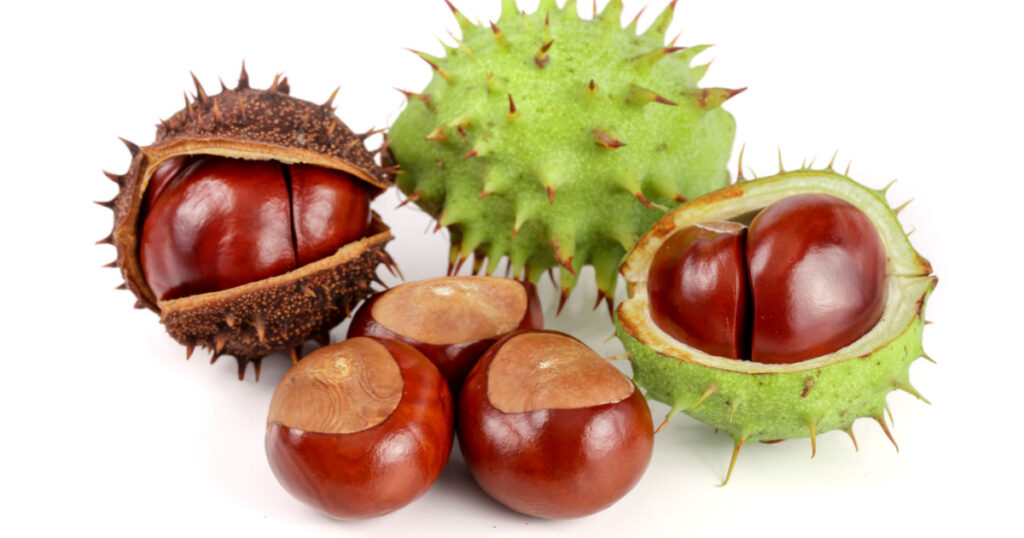
As we move ever closer to winter and the Christmas season in major cities around the world, the aroma of roasting sweet chestnuts will begin to fill the air. Roasted sweet chestnuts are such a holiday staple that there is even a song about it. Sweet chestnuts, however, have a cousin that, while they may not be edible, certainly have their own health benefits. These are called horse chestnuts. (1)
The raw seeds, bark, flowers, and leaves of horse chestnuts are not safe to eat as they contain a toxic component. Standardized horse chestnut seed extracts have this component removed and appear to be safe for short-term use. It is important to note that eating horse chestnuts is known to cause digestive problems, abdominal pain, nausea, vomiting, and throat irritation. Horse chestnuts are not to be confused with the aforementioned sweet chestnut. The following potential benefits are associated with horse chestnut extract.
1. Varicose Vein Relief
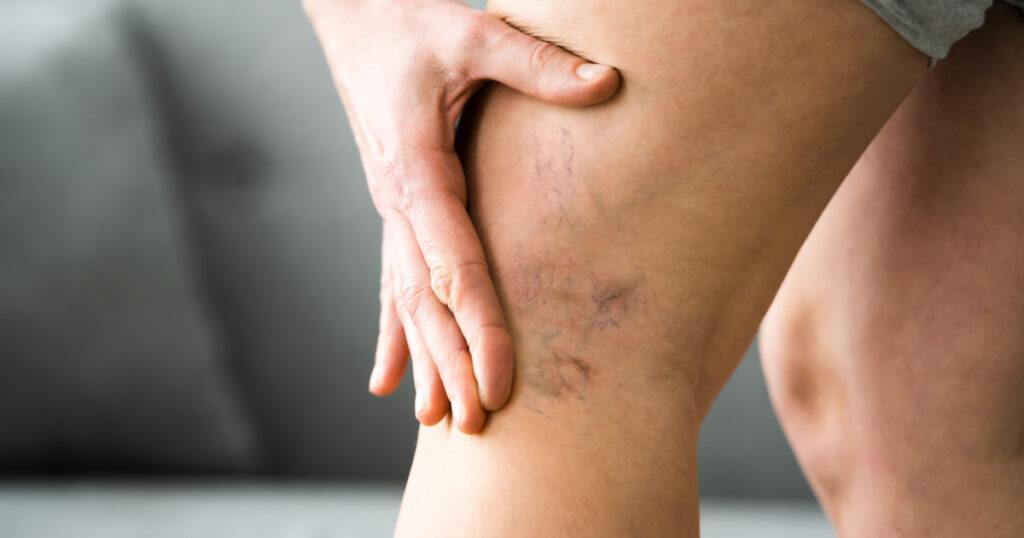
One of the most well-known uses of horse chestnut is for reducing the symptoms associated with varicose veins. Research suggests that horse chestnut seed extract may help decrease leg pain, swelling, and itching caused by this condition. It is believed to work by strengthening blood vessels and improving blood flow. (2)
2. Chronic Venous Insufficiency (CVI) Treatment

CVI is a condition that occurs when veins in the legs fail to efficiently return blood to the heart. Studies have demonstrated that using horse chestnut extracts can decrease the severity of CVI symptoms, such as leg swelling, pain, and heaviness. It is believed to achieve this by enhancing the tone and elasticity of veins.
3. Anti-inflammatory Properties

Horse chestnut contains compounds known as aescin, which exhibit potent anti-inflammatory effects. These properties have been investigated for their potential to reduce inflammation in conditions like arthritis, tendonitis, and injuries. While more research is needed, horse chestnut might offer a natural alternative for managing inflammatory conditions. (3)
Read: Things You Should Know Before Taking a Collagen Supplement
4. Antioxidant Effects

The antioxidants found in horse chestnuts can be valuable in combating oxidative stress in the body. Oxidative stress is a process associated with aging and various chronic diseases. By neutralizing harmful free radicals, horse chestnut’s antioxidant properties may contribute to overall cellular health and well-being. (4)
5. Potential Anticancer Effects

Studies have shown that some compounds present in horse chestnuts, such as aescin and aesculetin, exhibit anticancer activity. These compounds have been observed to inhibit the growth of specific cancer cells and induce apoptosis (programmed cell death). However, further research is required to explore the full potential of horse chestnut as an anticancer agent. (5)
6. Hemorrhoid Relief
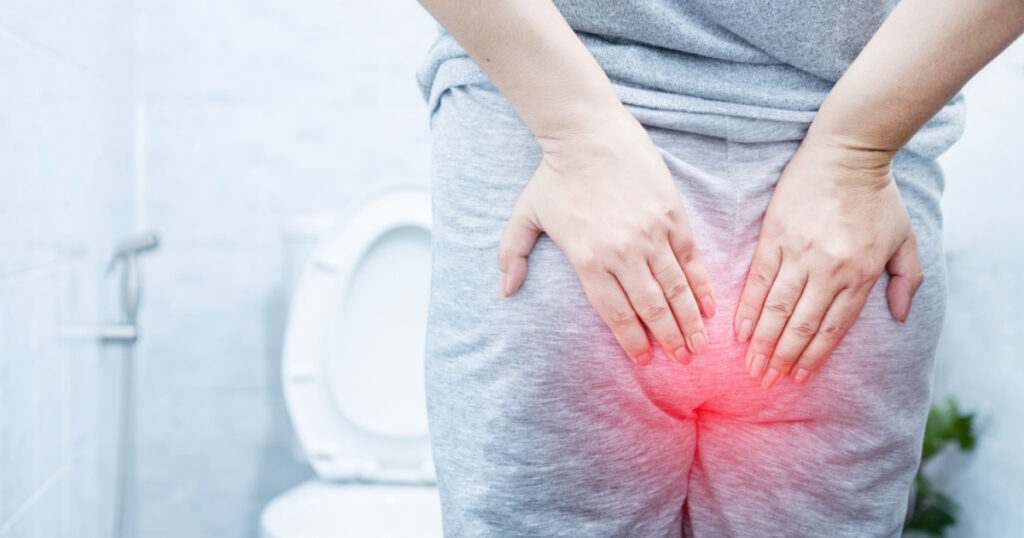
Horse chestnut extract may also provide relief for individuals suffering from hemorrhoids. It is thought to reduce swelling and inflammation around the affected area while alleviating symptoms such as pain, itching, and discomfort. Incorporating horse chestnut as a topical cream or oral supplement has shown promising results. (6)
Read: Melatonin: The Supplement That Can Aid With Sleep, Eye Health, Jet Lag, and More
7. Improved Venous Circulation

Another potential benefit of horse chestnut is its ability to enhance venous circulation. By increasing blood flow, it may prevent blood from pooling in the legs and reduce the risk of developing blood clots. This effect is particularly important for individuals with sedentary lifestyles or who experience long periods of sitting or standing.
How To Use Horse Chestnut
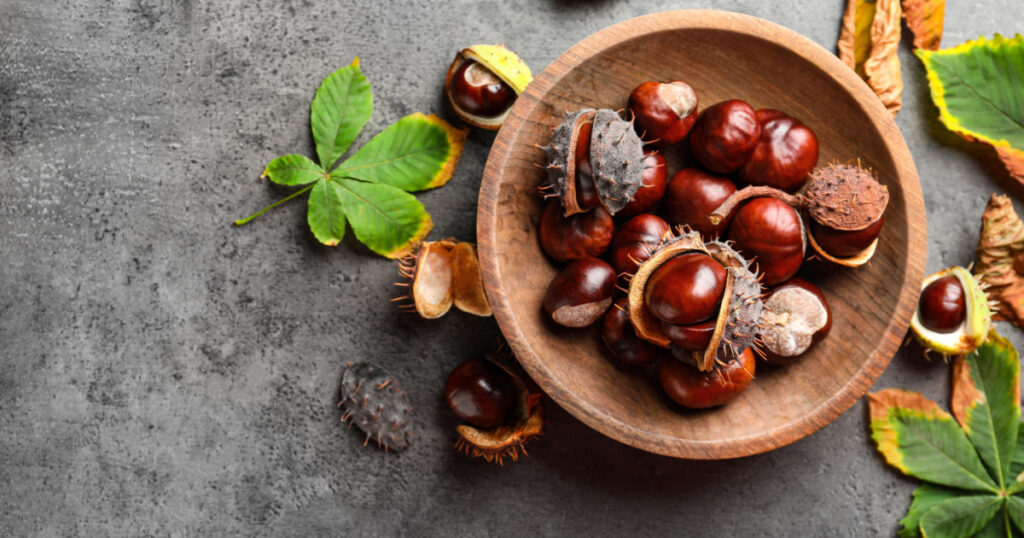
As already mentioned, you can’t eat horse chestnuts. To access their health benefits, you need to use horse chestnut as a topical cream or oral supplement. As with many natural remedies, the recommended dose will depend on the condition you’re treating and how serious it is. For example, if you have mild varicose veins, taking one horse chestnut capsule daily may be sufficient. As always, talk to your doctor before taking any new supplements. If you start to notice any adverse effects while taking it, stop immediately and go see your health care practitioner. (7, 8)
The Bottom Line
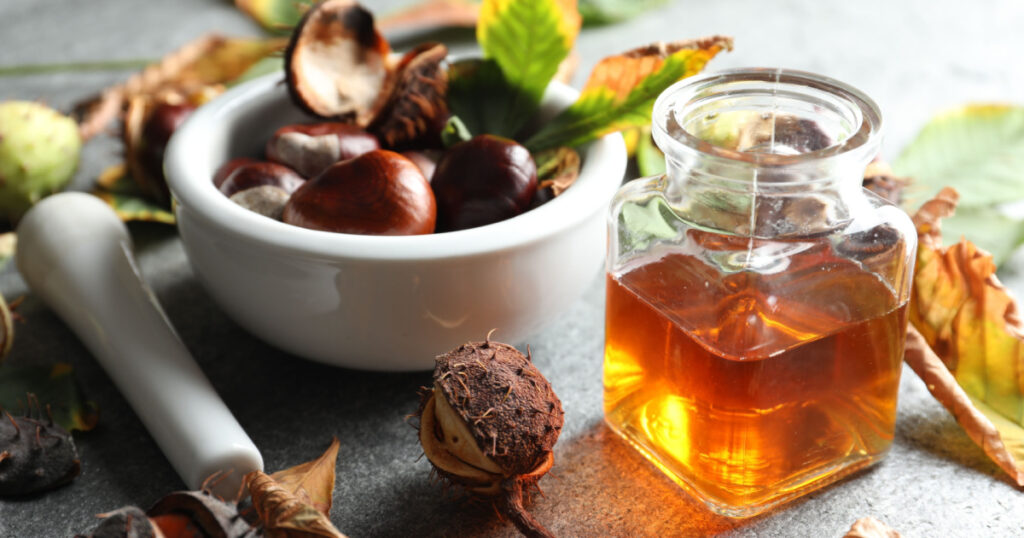
Horse chestnut offers a range of potential benefits and uses, from relieving varicose veins and reducing symptoms of CVI to providing anti-inflammatory and antioxidant effects. While research is ongoing, the evidence thus far supports horse chestnut’s therapeutic potential. However, it is vital to consult with a healthcare professional before incorporating horse chestnut supplements or treatments into your routine, as they may interact with other medications or have potential side effects.
Keep Reading: 9 Benefits of NAC (N-Acetyl Cysteine): The ‘Do-It-All Supplement’ You’ve Never Heard Of
Sources
- “Horse Chestnut.” NIH
- “Horse chestnut – efficacy and safety in chronic venous insufficiency: an overview.” Science Direct. Marlena Dudek-Makuch and Elżbieta Studzińska-Sroka. September–October 2015.
- “Escin attenuates cognitive deficits and hippocampal injury after transient global cerebral ischemia in mice via regulating certain inflammatory genes.” NCBI. Leiming Zhang, et al. September 2010
- “Antioxidant potential of Aesculus hippocastanum extract and escin against reactive oxygen and nitrogen species.” NCBI. J Vašková, et al. 2015.
- “Escin, a natural mixture of triterpene saponins, exhibits antitumor activity against hepatocellular carcinoma.” NCBI. Xue-ying Zhou, et al. December 2009.
- “Hemorrhoids and varicose veins: a review of treatment options.” NCBI. D MacKay. December 2001.
- “Horse Chestnut.” Examine. Kamal Patel. September 28, 2022
- “How to avoid confusing horse chestnuts with sweet chestnuts.” Anses. September 16, 2022.
Disclaimer: This information is not intended to be a substitute for professional medical advice, diagnosis or treatment and is for information only. Always seek the advice of your physician or another qualified health provider with any questions about your medical condition and/or current medication. Do not disregard professional medical advice or delay seeking advice or treatment because of something you have read here.
